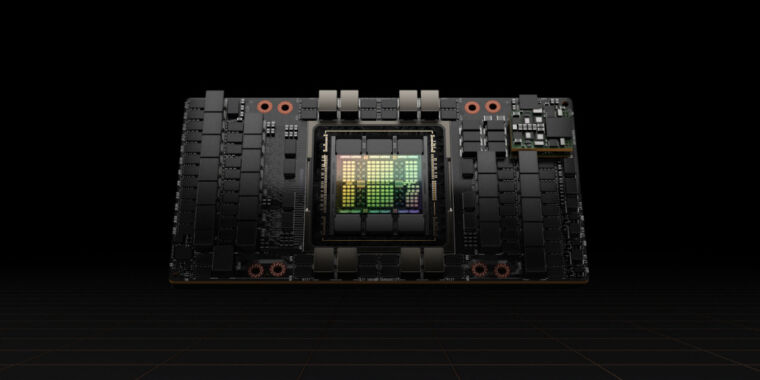- Nvidia is giving its newest AI chips to small cloud providers that compete with major players like Amazon Web Services and Google.
- The company is also asking these small cloud providers for the names of their customers, allowing Nvidia to potentially favor certain AI startups.
- This move highlights Nvidia's dominance as a major supplier of graphics processing units (GPUs) for AI, which are currently in high demand.
- The scarcity of GPUs has led to increased competition among cloud providers and Nvidia's actions could further solidify its position in the market.
- This move by Nvidia raises questions about fairness and competition in the AI industry.
Technology stock Nvidia is poised to join Apple and Microsoft in the exclusive group of U.S. companies with a market cap worth over $2 trillion, thanks to its strong performance, growth drivers, and increasing demand for processors used in artificial intelligence systems.
Nvidia warns that stronger US restrictions on chip sales to China will harm American companies in the long term, while also acknowledging that stricter rules wouldn't have an immediate material impact on their finances.
Nvidia expects to see $16 billion in revenue this quarter, driven by strong demand for its data-center chips used in artificial intelligence applications.
Nvidia's sales have doubled, reaching a record high of $13.5 billion, driven by increasing demand for its AI chips, and the company expects sales to continue to rise, with plans to buy back $25 billion of its stock.
Nvidia, the AI chipmaker, achieved record second-quarter revenues of $13.51 billion, leading analysts to believe it will become the "most important company to civilization" in the next decade due to increasing reliance on its chips.
Nvidia's stock is surging as its stellar earnings alleviate concerns about supply constraints and the role of Chinese customers in driving demand.
Nvidia's market capitalization surpassed that of the entire crypto market, reaching $1.18 trillion, after the chipmaker reported strong financial results, including double the net profit compared to the previous year, highlighting its leadership in AI hardware production and emphasizing the need for the crypto industry to embrace tokenization for similar growth.
Nvidia's dominance in the AI chip market and its reliance on a single manufacturer, TSMC, poses potential risks due to manufacturing disruptions and geopolitical tensions with Taiwan.
Chip stocks, including Nvidia, experienced a selloff in the technology sector despite Nvidia's strong performance, leading to concerns that spending on AI hardware may be affecting traditional chip companies like Intel.
Nvidia's soaring stock price, driven by the booming demand for its data center graphics cards in the AI arms race, has led to a high valuation, making it an opportune time to consider investing in Advanced Micro Devices (AMD) as it could benefit from the growing demand for AI chips and potentially capture a significant share of the data center GPU market.
Nvidia's strong growth potential and their ability to adapt to a slowing economy make them a key player in the stock market.
Nvidia plans to buy back billions of dollars in stock, signaling a potential trend that could boost the stock market.
Nvidia stock is currently at its cheapest since January, before it experienced a 250% rally.
Nvidia's shares reached a record high after the chipmaker announced its partnership with Google, while the court ruling against the SEC's denial of Grayscale's Bitcoin ETF provided a boost to cryptocurrency markets; however, economic data, including lower consumer confidence and a decline in job openings, raised concerns.
Nvidia's stock slips after reaching a record high, but analysts suggest that the chip maker may still be a bargain.
The U.S. has expanded export restrictions of Nvidia artificial-intelligence chips beyond China to other regions, including some countries in the Middle East, citing national security concerns.
Nvidia's stock has tripled in value in 2023, and while its valuation is high, the company's rapid growth, particularly in the AI market, justifies the price and suggests that it may continue to be a top growth pick for investors.
Semiconductor stocks, particularly Nvidia, have outperformed the market due to the high demand for chips in AI applications, making Nvidia the better AI stock to buy compared to Intel.
Nvidia's data center graphics cards continue to experience high demand, leading to record-high shares; however, investors should be aware of the risk of AI chip supply shortages. Microsoft and Amazon are alternative options for investors due to their growth potential in AI and other sectors.
Nvidia's dominance in the computer chip market for artificial intelligence has led to a significant decline in venture funding for potential rivals, with the number of U.S. deals dropping by 80% from last year. The high cost of developing competing chips coupled with Nvidia's strong position has made investors wary, resulting in a pullback in investment.
这篇文章提到了Nvidia Corporation (NASDAQ:NVDA)的股票。作者没有给出具体的建议是买入、持有还是卖出。作者的核心论点是Nvidia正在经历一个类似于苹果 iPhone 的转折点,将重新定义其市场地位。作者还提到了Nvidia与苹果的相似之处,如持续的现金流、定价权和竞争壁垒等。关键信息和数据包括Nvidia的云服务收入增长、顶级客户集中度以及市场占有率等。
Nvidia, known for developing hardware and software for AI models, is the "picks-and-shovels play" of the AI industry, according to Shark Tank's Kevin O'Leary, despite the stock's high valuation. O'Leary believes Nvidia is the company best positioned to capitalize on the trillion-dollar AI market.
Nvidia has tripled its stock so far in 2023, but it is not among the best performing stocks of the year, as Carvana, MoonLake Immunotherapeutics, IonQ, and others have outperformed it.
Arm Holdings and Nvidia, two chip stocks with strong competitive advantages, have gained favor among investors, but their high valuations are not justified by their growth prospects, making them overpriced investments.
